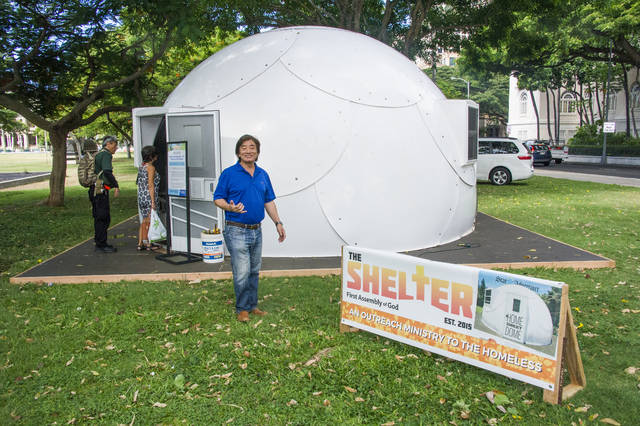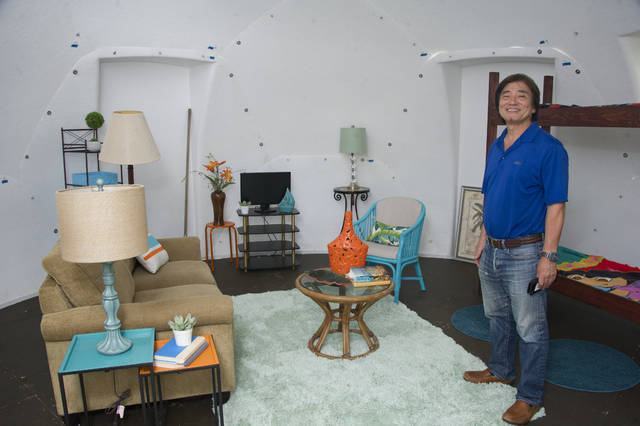Church showcases dome for sheltering homeless

CRAIG T. KOJIMA / CKOJIMA@STARADVERTISER.COM
First Assembly of God has moved an igloo-shaped shelter from the church in Moanalua to the state Capitol lawn during the special legislative session to give lawmakers and the public a chance to see it in person. Pastor Daniel Kaneshiro shows off the shelter.

CRAIG T. KOJIMA / CKOJIMA@STARADVERTISER.COM
Pastor Daniel Kaneshiro stands in the shelter’s interior.


First Assembly of God in Moanalua set up its Alaska-made “spherical dome” on the grounds of the state Capitol to give city and state lawmakers a chance to see how 45 homeless mothers and their children would live in Kahaluu.
The Moanalua-based church moved the igloo-shaped shelter from its grounds Saturday before the start of Monday’s special legislative session to give lawmakers and the public a close-up view of the dome that they’ve been reading and hearing about for more than a year ever since First Assembly of God shipped the first one in from Juneau, Alaska.
First Assembly of God, with the help of a handful of other churches, has 11 more of the $9,500, 12-foot-tall, 314-square-foot domes sitting in a shipping container on its Kahaluu property, waiting for its application for a city building permit to get approved, said Pastor Daniel Kaneshiro.
The first dome hasn’t been used for its intended purpose — providing shelter for homeless people — since it arrived last year.
The church had to move the dome for an outdoor wedding, anyway, and relocating it to the Capitol from Saturday to Sept. 5 seemed like a good way “to increase public awareness,” Kaneshiro said. “This is an opportunity for people to see it firsthand.”
First Assembly of God owns 4 acres of land in Kahaluu and plans to erect all 12 domes on 1.25 acres that are zoned for residential use, perhaps as early as September, Kaneshiro said.
Don't miss out on what's happening!
Stay in touch with breaking news, as it happens, conveniently in your email inbox. It's FREE!
“We’re really close,” he said.
Nine of the domes would be used to house single mothers and their children. No adult men or pets would be allowed.
Two of the remaining domes would be outfitted with toilets, showers and sinks, and another would house a resident manager.
Unlike the Housing First programs operated by the city and state that welcome homeless clients with drug, alcohol and mental health issues, First Assembly’s homeless clients would have to have jobs or be enrolled in job training programs, and must be clean and sober, without mental health issues, Kaneshiro said.
“This is not Housing First,” he said. “They have to be willing to work and acknowledge that they are in a faith-based program. We’re targeting women with children.”
The idea is to create an environment where homeless mothers and their children can get off the street, regroup and, with assistance, move into permanent housing, Kaneshiro said.
But there is no specific timetable when a family would have to move out, he said.
“It could be six months, nine months,” Kaneshiro said.
Kaneshiro has gone before the Kahaluu Neighborhood Board, where he said board members had “legitimate concerns” about issues including sewer capacity, security and safety.
Prospective clients would be vetted by the Institute for Human Services, Kaneshiro said, and “would not be coming off of the street.”
Neighborhood Board Chairwoman Flora Obayashi said she cannot speak to the issue because the board did not take any action. Other board members said Obayashi told them that she is the only person who can comment for the Kahaluu Neighborhood Board.
Three other First Assembly churches have contributed money to sponsor some of the domes, along with New Hope Windward, Inspire Church in Waikele and New Life Church in Chinatown, Kaneshiro said.
“It has gone beyond just First Assembly,” he said.
Even though the church has yet to erect its first dome in Kahaluu, it’s already looking for partners to create something similar on the Leeward Coast, Kaneshiro said.
For the Kahaluu project, he said, “We’re praying it will be in the September-October time frame to bring in the first families. But this is just the first phase. We’re already looking for partners on the Leeward side.”




